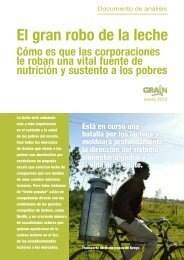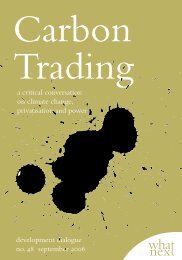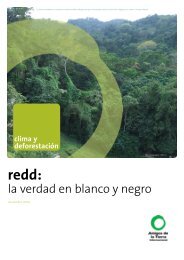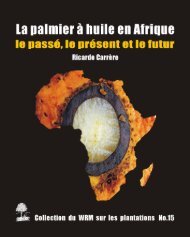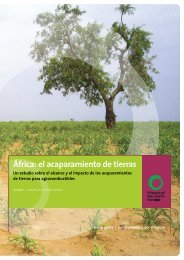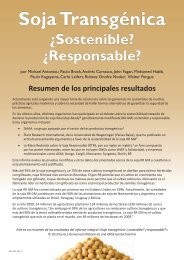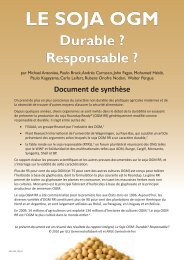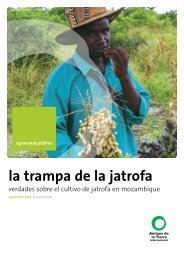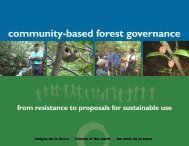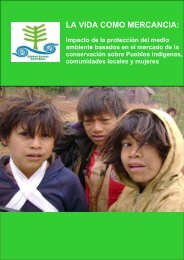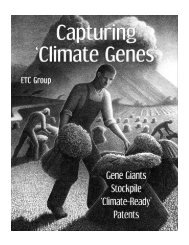Plantations, poverty and power - Critical Information Collective
Plantations, poverty and power - Critical Information Collective
Plantations, poverty and power - Critical Information Collective
Create successful ePaper yourself
Turn your PDF publications into a flip-book with our unique Google optimized e-Paper software.
60<br />
From 1987 to 1996, the air smelled very bad, villagers said. It has improved since Indah Kiat installed a<br />
filtering system on factory chimneys. But the air is still polluted <strong>and</strong> still causes respiratory problems,<br />
especially for visitors.<br />
Villagers told Syum<strong>and</strong>a <strong>and</strong> Noor that before the mill started operations, fishers could catch 40 to 50<br />
kilogrammes of fish a day in the Siak River. Today, they are lucky to catch four or five kilogrammes.<br />
Sometimes, they said, the river smells really bad <strong>and</strong> they cannot catch anything. Every month, the river<br />
gives off a bad smell for a week. 296<br />
APP’s monoculture tree plantations<br />
APP’s Indah Kiat pulp mill gets its raw material mainly from Arara Abadi, which is, as mentioned above,<br />
also part of the Sinar Mas Group. Arara Abadi has a concession area of just under 300,000 hectares.<br />
About 60 per cent of this area was previously covered with forest. By 2003, about 228,000 hectares had<br />
been planted with Acacia mangium.<br />
Despite the impact of APP’s operations in Sumatra, the company continues to receive support from<br />
professional foresters. In 2000, an Australian forester called Stephen Midgley visited Sumatra to look at<br />
“some commercial forest plantations”, as he calls Arara Abadi’s industrial monocultures. At the time of<br />
his visit to Sumatra, Midgley was Portfolio Manager, Tree Improvement <strong>and</strong> Genetic Resources Program<br />
at the Commonwealth CSIRO. A photograph accompanying his article in the Australian Tree Resources<br />
News (published by CSIRO) shows an aerial view of the plantations. The monoculture stretches to the<br />
horizon. Midgley’s report of his visit to Sumatra makes no mention of the forests cleared to make way for<br />
these plantations. Neither does he mention the impact of the forest clearance <strong>and</strong> plantations on local<br />
people’s livelihoods. Midgley wasn’t in Sumatra to look at forests or talk to people affected. Instead he<br />
was interested in one tree species only: Acacia crassicarpa. Arara Abadi has planted about 40,000<br />
hectares with this species. 297<br />
Midgley calculates that Arara Abadi’s 40,000 hectares of Acacia crassicarpa represented an asset worth<br />
more than US$1 billion, based on the current world price for kraft pulp. Midgley claims that the<br />
plantations are “offering opportunities for employment <strong>and</strong> economic development for many Indonesians,<br />
<strong>and</strong> industrial opportunities for larger companies”. 298 Six months after Midgley’s visit, APP defaulted on<br />
its debts. The “economic development” that Midgley described was little more than a sham.<br />
The company frequently overstates the growth rate of its plantations. According to Arara Abadi’s<br />
Research <strong>and</strong> Development Unit the plantations have an annual growth rate of 30-35 cubic metres per<br />
hectare. The target is 45 cubic metres per hectare. CIFOR points out that these figures come from<br />
296 Rivani Noor <strong>and</strong> Rully Syum<strong>and</strong>a (2006) “Social conflict <strong>and</strong> environmental disaster: A report on Asia Pulp <strong>and</strong><br />
Paper’s operations in Sumatra, Indonesia”, World Rainforest Movement, August 2006.<br />
http://www.wrm.org.uy/countries/Indonesia/book8.html<br />
297 Stephen Midgley (2000) “Acacia crassicarpa: a tree in the domestication fast lane”, Australian Tree Research News,<br />
Forestry <strong>and</strong> Forest Products, CSIRO, Number 6, October 2000.<br />
Midgley has now set up a consulting firm called Salwood, which recently won a contract with Stora Enso in Laos.<br />
Stora Enso aims to plant an area of 35,000 hectares with eucalyptus to feed its operations in China.<br />
298 Stephen Midgley (2000) “Acacia crassicarpa: a tree in the domestication fast lane”, Australian Tree Research News,<br />
Forestry <strong>and</strong> Forest Products, CSIRO, Number 6, October 2000.



